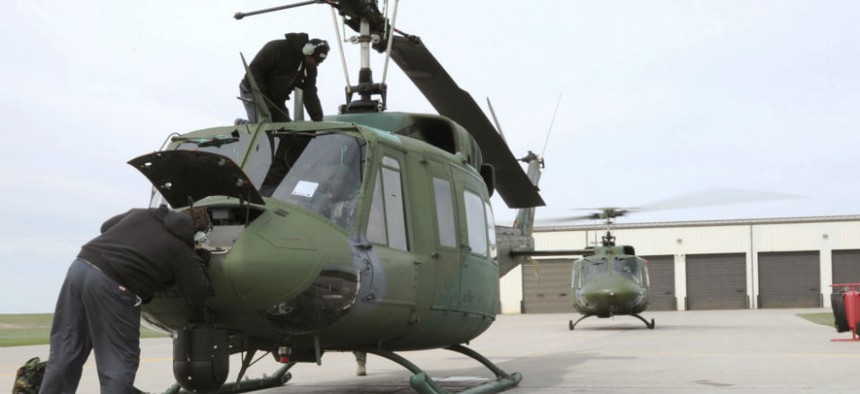
Mechanics at Minot Air Force Base, N.D., inspect a UH-1N Huey. Senior Airman Brittany Bateman/Defense Department file photo
Some Feds Just Got a 34 Percent Pay Boost
The change affects blue-collar workers in western North Dakota, where the oil and natural gas boom have increased private wages and the cost of living.
Federal employees in certain skilled occupations in North Dakota and Montana will receive a significant pay boost to help match a spike in the area’s private-sector salaries, according to the Office of Personnel Management.
The roughly 34 percent pay increase affects about 160 federal blue-collar workers in 17 different occupations, including electricians, mechanics and drill rig operators, employed at Minot Air Force base, among several other locations in western North Dakota and one in Montana. Click here for the new rates, effective March 22.
The American Federation of Government Employees as well as North Dakota’s two senators have called on OPM to address the discrepancy between public and private-sector wages in the area -- particularly in the Bakken region -- which has made it more difficult for the federal government to recruit and retain skilled blue-collar workers. The boom in oil and natural gas drilling in the area has increased the cost of living as well as the average hourly salary for industry workers. Private-sector companies on average are paying workers about $40 an hour in the North Dakota wage area; under the special rates, a worker at the WG-10, step 2 rate – the payline rate for such federal workers – will earn 82 percent of that figure, or about $33 per hour. Before the change, the hourly rate for that category was $24.55.
Affected supervisors also will receive pay boosts between 10 percent and 30 percent as a result of the change.
About 100 employees at Minot who are paid with non-appropriated funds, including custodial workers and food service workers, received a similar wage increase in December. The federal wage system covers employees paid by the hour with appropriated and non-appropriated money.
“Federal employees have seen their purchasing power dwindle due to the oil shale boom,” said AFGE President J. David Cox Sr., in a statement praising OPM for the change. “Private-sector employers have already responded to the market by raising their wages, but the federal government has lagged behind. We will continue fighting to increase wages for all employees in the area.”
North Dakota Sens. Heidi Heitkamp (D) and John Hoeven (R) both have pushed for higher wages for federal workers in the region. “By recognizing the higher cost-of-living our people have faced, we can help ensure that we retain and attract the most qualified, high-quality workers to fill these roles,” Hoeven said in a statement.
Heitkamp said she make it clear to OPM that the agency should “be more aggressive in using its authority to support North Dakotans who dedicate their professional lives to public service and who help critical jobs in North Dakota industries.”
The special pay rates will affect certain employees at the following locations: Minot Air Force Base; the Agricultural Research Service in Mandan, N.D.; Army Corps of Engineers facilities in Riverdale and Williston, N.D.; National Guard bureaus in Minot and Bismarck, N.D.; Bureau of Reclamation facilities in Billings, Mt., and Coleharbor, N.D.; National Park Service sites in Medora and Coleharbor, N.D.; and the Fish and Wildlife Service in Kenmare, N.D.







